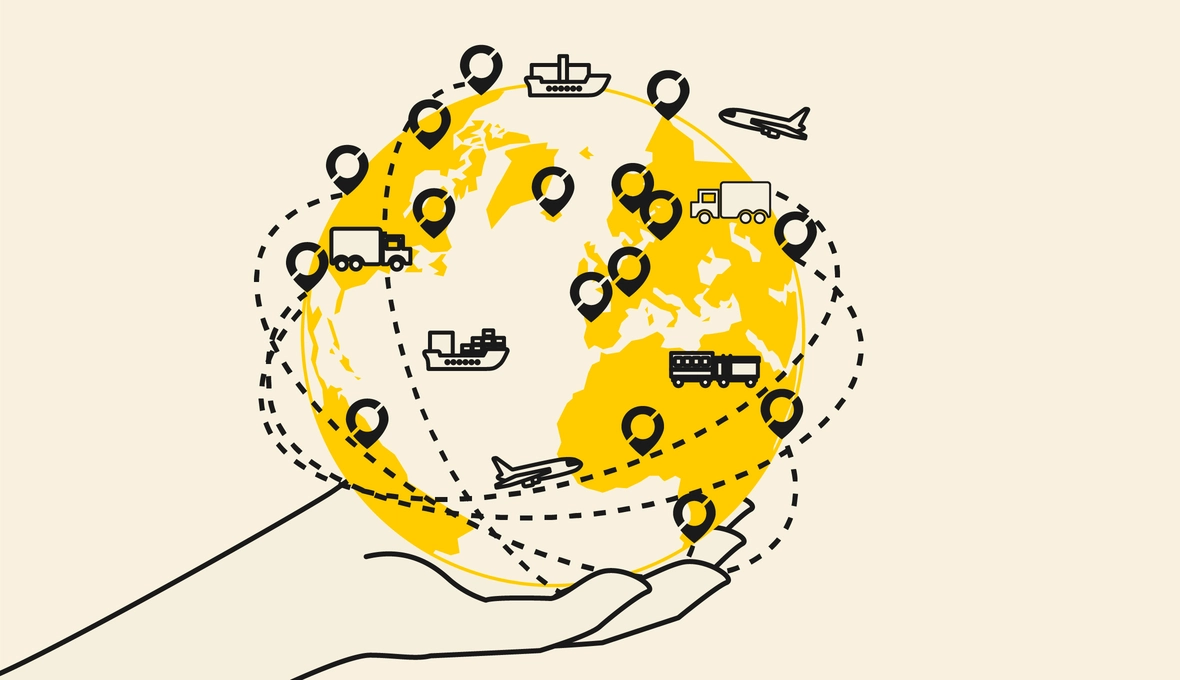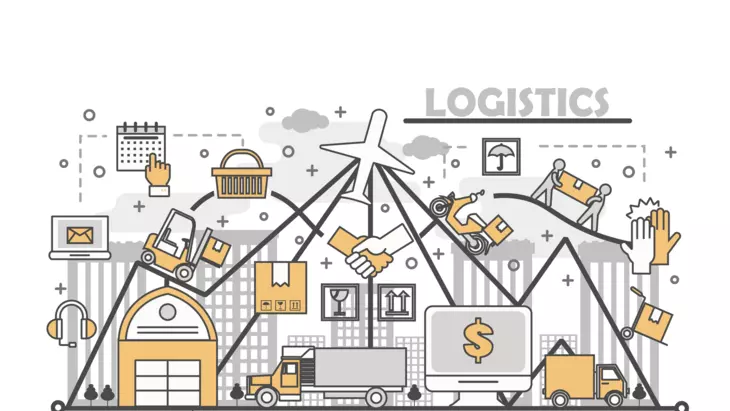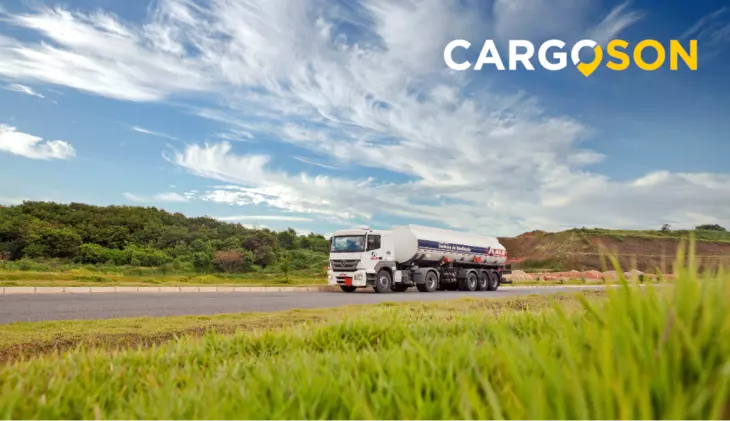Veohaldustarkvara või logistikatarkvara kauba omanikele (inglise keeles Transport Management Software - TMS) on tarkvara, mis aitab ettevõtetel (tootjad, hulgimüüjad, jae müüjad, e-kaupmehed) hallata ja jälgida oma ettevõtte kaubaveo logistikat.
Logistikaportsesside automatiseerimine ja digitaliseerimine aastal 2025
Veohaldustarkvara kasutuselevõtt on viimastel aastatel üks lihtsamaid ja tõhusamaid viise ettevõtte logistikaprotsesside automatiseerimiseks ja digitaliseerimiseks.
Veohaldustarkvara abil saab ettevõte kogu oma erinevate partneritega hallatavat kaubavoogu hõlpsalt jälgida, hõlmates nii import, eksport kui kohalikke riigisiseseid saadetisi ning erinevaid veo liike (kuller, maantee, meri, lend, raudtee). Viimastel aastatel on veohaldustarkvara laialdaselt kasutusel erinevates valdkondades, peamiselt tootmine, hulgimüük, jaemüük ja e-kaubandus. Viimaste aastate IT-tehniliste võimekuste tõusu arengust tulenevalt on veohaldustarkvara muutunud veelgi efektiivsemaks ja võimaldab ettevõtetel saavutada paremat läbipaistvust, kulude ja aja kokkuhoidu ning klienditeeninduse kvaliteeti tõusu.
Kuidas saab logistikatarkvara (TMS) ettevõtteid aidata?
Siin on juhend erinevate funktsionaalsuste ja võimaluste kohta, kuidas veohaldustarkvara saab ettevõtteid nende kaubaveo logistikas ja veohalduses aidata.
-
Saadetiste- või logistika töölaud – koondab kogu kaubaveo info ühte vaatesse ja annab täieliku ülevaate iga saadetise kohta, olenemata saatmisviisist, vedajast või kasutajast. Läbipaistev ülevaade kõigist ettevõtte tellimustest ja tarkvara kasutajate tegevustest ühes aknas.
-
Hinna- ja hinnakirjade haldus – võimaldab hallata kõiki oma erinevaid veohindu ja hinnakirju ühes süsteemis. Olenemata hinnakirjade eripärast või hinnakirjade hulgast, saab seda teha efektiivselt ning hallata ühest kesksest süsteemist. Tsentraliseeritud veotariifide haldamine säästab aega ja pakub lihtsust, koondades ja visualiseerides kõik õhu-, mere-, kulleri- ja maanteetranspordi hinnad. Hinnakirja haldus näitab välja ka erinevate vedajate erinevad lisatasud ja statistika ajalooliste andmetega. Ei ole vahet, kas töötad ostu-, müügi-, logistika-, lao- või raamatupidamis osakonnas, kõigile on tagatud ligipääs samadele reaalajas uuenevatele andmetele.
-
Veohinna kalkulaator – online tööriist, mis arvutab ühes vaates erinevate vedajate ja saatmisviiside hinnad ja tarneajad.
- Hinnapäringud - logistikatarkvara võimaldab saata ühekordseid (spot/ad-hoc) hinnapäringuid erinevatele vedajatele, et saada veebipõhised veohinnad ja tarneajad tagasi enda ettevõtte veohaldustarkvarasse või ERP süsteemi. Hinnapäringud on oma loomult ühekordsed vedajapõhised veopakkumised transportimiseks kaupu maanteel, õhus, raudteel või merel. Veopakkumised sõltuvad paljudest teguritest, kuid peamisteks faktoriteks on kauba kogus, tüüp, suurus ja saadetise lähte- ning sihtkoht.
- Tellimine – veohaldustarkvara edastada veotellimusi erinevatele vedajatele ühest süsteemist. Parimad veohaldus süsteemid on integreerinud kõikide erinevate vedaja e-keskkonnad ning tellimused edastatakse vedaja süsteemi elektrooniliselt API ühenduse kaudu. Vedajate puhul kellel oma e-keskkonda ei ole, edastatakse veotellimused e-posti teel (tavaliselt ka korrektne PDF vorming).
- Jälgimine – annab saadetise asukoha ülevaate kas vedaja jälgimise lingi ja/või logistikatarkvara veotellimuste ülevaate kaudu. Tavaliselt kuvatakse saadetiste ülevaade (saadetiste töölaual). Mõnedes süsteemide või vedajate puhul, mis pakuvad detailsemat ülevaadet, kuvatakse kaardil saadetise või veovahendi (kaubik, veoauto, konteiner, lennuk) reaalajas GPS-asukoht.
- Dokumentatsioon – veohaldustarkvara aitab luua ja võimaldab saadetise põhiselt üles laadida ning salvestada erinevaid transpordi korraldusega seotud dokumente. Parimad veohaldus süsteemid genereerivad automaatselt selliseid veodokumente nagu kauba etiketid, veoseleht (saateleht), e-veoseleht (e-saateleht), CMR (e-CMR), ohtlike kaupade deklaratsioon (DGD), konossement ja võimaldavad veodokumente üles laadida mõlemale poolele (veotellija ja vedaja) – pakendi nimekiri, kaubaarve, kohaletoimetamise tõestus (POD), transpordiarve, kauba päritolu sertifikaat, kindlustussertifikaat, akreditiiv, ekspordilitsents, laoleht ja mitmeid muid asjakohaseid dokumente.
- Kommunikatsioon – logistikatarkvara on suuteline pakkuma suhtlusmoodulit operatiivseks vestluseks kauba omaniku (saatja) ja vedaja (logistikateenuse pakkuja) vahel. Parimad veohaldustarkvarad pakuvad reaalajas saadetisepõhist vestlusmoodulit, mis talletab kogu vestluse ajaloo saadetise logisse ning on toetatud nii veebis kui mobiiliäppis.
- Teavitused - automaatne teavituste süsteem operatiivinfo saatmiseks veohaldustarkvara kasutajatele, tarnijatele, klientidele ja vedajatele. Parimad veohaldustarkvarad pakuvad seadistatavaid, branditud ja erinevaid tüüpi teavitusi – Tellimuse kinnitus; Etikettide edastamine; Veoauto numbrimärgi edastamine; ETA uuendus (eeldatava saabumisaeg).
- CO2 mõõtmine – kalkuleerib ja salvestab ettevõtte CO2 heitkoguseid erinevate kaubaliikide õhu-, mere-, maantee- ja rongitranspordiga. Parim veohaldustarkvara arvutab iga saadetise CO2 hetikoguse ennem veotellimuse edastamist ning võtab arvesse vedaja autoparki, CO2 kompenseerimist ja meetmeid.
-
Aruandlus – võimaldab ettevõttel omada süsteemset ülevaadet turuanalüüsi ja ettevõtte enda KPI mõõdikute võtmes. Antud aruandeid saab tavaliselt alla laadida vastavalt või saata automaatselt e-posti vastavalt soovile.
- Turundusanalüüsi aruanded – turu ülevaade, kulude ülevaade, tarneaegade ülevaade, püsikokkuleppelised veotellimused versus ühekordsed tellimused jne.
- Operatiivsed KPI aruanded – laadimisaeg, tarneaeg (ETD – eeldatav kohaletoimetamise aeg vs ATD – tegelik tarneaeg), hilinenud saadetised, teostamata laadimised, kohale toimetatud saadetiste aruanne jne.
- Statistika – moodul, mis annab faktilise ülevaate veotellija andmetest veohaldustarkvaras – veokulu, kokkuhoid, tellimused, veosuunad, vedajad, tarnijad, hinnad, aadressid, tarneajad, arvestuslik kaal, jne. Parimad transpordihaldussüsteemid pakuvad CO2 heitkoguste statistikat, kui ka võimalust vaadata statistikat nii visualiseeritud kujul erinevates vaadetes (tabel, graafik) kui excel väljavõtte formatsioonis.
- Aadressiraamat – ettevõtte kontaktide andmebaas, mis salvestab automaatselt kõikide tarnijate ja klientide kontaktandmed – nimi, e-mail, telefoninumber, aadress, kommentaarid ja soovitud puhkudel ka maksjakoodid. Parimatel veohaldustarkvaradel on kasutusel Google'iga integreeritud nutikad aadressiraamatud, mis aitavad kasutajatel leida ja salvestada aadresse hõlpsasti ka esmakordsel sisestamisel.
-
Laadimiste kalender – tööriist ettevõtte kauba laadimistest ülevaate andmiseks ja töö efektiivseks planeerimiseks. Nutikas abivahend lao töö- ja laadimiste juhtimises, mis võimaldab ettevõtetel planeerida ja koordineerida oma sissetulevate või väljuvate kaupade laadimisi.
Laadimiskalender võimaldab ettevõtte põhiselt seadistada oma enda laadimissillad, millised on tööajad, millised on laadimise piirangud, broneerida laadimisi kalendrisse, märkida millal auto jõudis, millal laadimist alustati, millal lõpetati jne. Vastavate tööriistade puhul on olemas lihtsama funktsionaalsuse astmega tööriistu (LoadingCalendar.com) ja väga spetsiifilisi suurema funktsionaalsusega tööriistu (GoRamp või Transporeon).
- Kolmanda osapoole tellimine – funktsionaalsus, mis võimaldab anda ligipääsu Sinu tarnijatele Sinu ettevõtte veohaldustarkvara kontole, et tarnijad saaksin luua Sinu ettevõtte nimel saadetisi, teha tellimusi, printida etikette, e-veoselehti ja CMR-e. Kolmanda osapoole tellimine annab veohaldustarkvara kasutajatele täieliku ülevaate Sinu ettevõtte transporditellimustest, mis on tehtud Sinu enda või Sinu tarnijate poolt – import, eksport ja riigisisene kohalik vedu.
- Automaatne vedajavalik – Funktsionaalsus, mis võimaldab teha transporditellimusi Sinu eest – automaatselt. Tööriist on suuteline tegema veotellimuse Sinu eelkirjeldatud ning määratud kriteeriumite alusel (hind, tarneaeg, veo suund) Sinu veohaldustarkvara vedajate nimistust.
Veohaldustarkvara, logistikaprofessionaali parim sõber aja säästmiseks ja kulu kokkuhoiuks (8 põhjust)
Logistikatarkvara aitab muuta ettevõttel oma transpordikorraldusega seotud tegevusi lihtsamaks, läbipaistvamaks ja on muutumas normaalsuseks kuidas ettevõtte kaubalogistikat hallata. Siin on 8 lihtsat põhjust, miks veohaldustarkvara kasutada.

-
Kommunikatsioon ja vedude tellimine erinevate vedajatega ühes aknas – optimaalseimad transpordi valikud. Otsene kasu - LÄBIPAISTVUS, MUGAVUS, AJASÄÄST
-
Ülevaade enda ja kõigi kolleegide veotellimustest. Otsene kasu - LÄBIPAISTVUS, ÜHINE INFOVÄLI, PUHKUSED / ASENDAMINE / UUED TÖÖTAJAD, AJASÄÄST, MUGAVUS
-
Hinnakirja haldamine ning saadetisepõhine hinna, tarneaja ja CO2 heitkoguste võrdlus. Otsene kasu - KULUDE SÄÄST, PARIMAD VÕIMALIKUD VEOTINGIMUSED, TEADLIKUD OTSUSED, MÕÕTMINE
-
Ühekordsed veo hinnapäringud. Otsene kasu - KIIRUS, INFO ÜHES KOHAS, VÕRDLUS, AJASÄÄST
-
Automaatne teavitussüsteem klientide ja tarnijate teavitamiseks (ETA, ETD, etiketid, muudatused ja veoautode numbrimärgid). Otsene kasu – AJASÄÄST, SISEMINE JA VÄLINE ÜHENDATUD TEAVE – KOLLEEGID / KLIENDID / TARNIJAD, TÄIUSTATUD KLIENDITUGI
-
Saadetise veostaatused ja jälgimine ühel logistika töölaual. Otsene kasu – ETTEVÕTTE SISENE JA VÄLINE ÜHENDATUD INFO – KOLLEEGID / KLIENDID / TARNIJAD, MUGAVUS, AJASÄÄST, HILINENUD SAADETISTE ÜLEVAADE
- Põhjalik statistika ja aruanded. Otsene kasu – TARNEAEGADE, KULUDE JA MUUDE ANDMETE ÜLEVAADE – VEDAJATE, SUUNDADE, KASUTAJATE, TARNIJATE, KLIENTIDE LÕIKES
- Veohaldustarkvara ja majandustarkvara või e-poe integratsioon. Otsene kasu – AUTOMAATSIOON, AJASÄÄST, KULUDE SÄÄST, VÄHENENUD VIGADE HULK, MUGAVUS
Kuidas valida logistikatarkvara? Milline süsteem sobib teie ettevõtte vajadustega?
Sobiliku veohaldustarkvara valimine on väga oluline otsus, mis tuleb teha hoolikalt. See ei tähenda ainult süsteemi valimist, mida saate endale lubada, vaid ka teie vajadustele ja ärieesmärkidele vastava tarkvara leidmist. Tõsi. Veohaldustarkvarasid ei ole veel väga palju, ent kindlasti on ka see lähiajas muutuv. Siiski on oluline teada kas pakutab logistikatarkvara on Sinu ettevõtte jaoks sobilik. Siin on peamised punktid, mida sobiva veohaldustarkvara kaalumisel arvestada.
- Ettevõtlusharu – tootja, hulgimüüja, jae müüja või e-kaubandus
- Sinu ettevõtte suurus
- Sinu ettevõtte logistikaprotsesside keerukus
- Veotellimuste hulk
- Veotellimuste tüüp (kauba eripära)
- ERP, WMS või e-kaubanduse integreerimine (olenevalt teie tööstusharust)
- Vedajate integratsioonid veohaldustarkvaras
- Lisafunktsioonid
- Eelarve
Tootjatel, jae müüjatel, hulgimüüjatel ja e-kaubandusega tegelevatel ettevõtetel võivad veohaldustarkvara valimisel olla erinevad vajadused ja aspektid.
Veohaldustarkvara tootmisettevõttele - valimisel tuleb kaaluda peamiselt seda, kuidas logistikatarkvara saab toetada Sinu organisatsiooni tootmise planeerimist, laadimisaegade broneerimist ja haldust, ülevaate kuvamist sissetulevatest ja väljaminevatest kaupadest / tarnetest ning kas süsteem pakub läbipaistvust kulude, tarneaegade ja keskkonnajalajäle kuvamisel
Veohaldustarkvara Hulgimüügi ettevõttele - valimisel tuleks keskenduda selgele ülevaatele kõigist sissetulevatest, väljaminevatest, siseriiklikest tellimustest, töötajate poolt tehtavate vigade arvu vähendamise võimalusest, oma tarnijate ja klientide automaatse teavituse võimalusest ning pöörata tähelepanu, et Sinu ettevõtte tarnijate ja klientide vahelise kaubavahetuse info oleks diskreetselt hoitud.
Veohaldustarkvara Jaemüügi ettevõttele - valimisel tuleb kaaluda eelkõige õigeaegseid tarneid, et kaubad jõuaksid tootjatelt õigeaegselt klientideni. Tähelepanu tuleb pöörata saadetiste jälgimise funktsioonidele, veotellimuste staatuste olemasolust ja automatiseeritud ülevaateks hilinenud saadetiste puhul. Samuti on oluline KPI-d kvantifitseerida, mõõtes samal ajal jaemüügiettevõtte konkreetseid mõõdikuid. Näiteks selleks, et teha täiendavaid vedaja- või veosuuna põhiseid analüüse - võrrelda lubatud peale laadimise aega (ETA) reaalse peale laadimise ajaga (ATA) või lubatud kohaletoimetamise (ETD) aega reaalse kohaletoimetamise ajaga (ATA), et mõõta õigeaegselt kohalteoimetatud saadetiste hulka (OTD).
Veohaldustarkvara E-kaubandus ettevõttele (e-pood) - valimisel tuleb kõigepealt kindlaks teha, kas teie e-kaubanduses müüdavad kaubad on pigem pakid ja karbid või müüte te ka kaubaaluseid, osakoormaid või täiskoormaid. Põhjus seisneb selles, et antud parameetrid jagavad e-kaubanduse automatiseeritud saatmislahendused kaheks. Väiksemate kaupade, pakendite ja karpide jaoks on palju lahendusi ja platvorme – mõned neist on kolmanda osapoole teenusepakkujad (nt Shipstation, Shippo, Outvio) ja mõned veohaldustarkvarad (nt nShift), millel on integratsioon kulleritega. Suuremate kaupade – kaubaalused, osakoormad, merekonteinerid ja täiskoormad – jaoks on vaja, et veohaldustarkvara oleks integreeritud muuhulgas ka juba suuremat kaupa vedavate veo ettevõtega ja selliseid süsteeme leidub täna vaid mõni üksik.
Kuidas saab veohaldustarkvara (TMS) aidata ettevõtet - 3 praktilist kliendilugu
Tootmisettevõtte praktiline kliendilugu
Kuidas Tootmisettevõte kulutas transpordi tellimisele 20-30% vähem aega päevas. Ülemaailmne pakendite tootmise ettevõte jagab oma parimat praktikat, kuidas transpordihaldussüsteem on aidanud ettevõtet efektiivsemaks muuta, automatiseerides osa logistikaülesandeid ja koondades kõik transpordipartnerid ühte süsteemi. Tootmisettevõtte praktiline kliendilugu.
Hulgimüügiettevõtte praktiline kliendilugu
Kuidas hulgimüügi firma saab transpordiinfot reaalajas jälgida! Piirkondlik elektriseadmete hulgimüüja jagab oma lugu sellest, kuidas veohaldustarkvara on nende klientidele lisaväärtust pakkunud ja kuidas nad ei pea enam korduvat käsitsitööd tegema. Hulgimüügiettevõtte praktiline kliendilugu
Jaemüügiettevõtte praktiline kliendilugu
Kuidas jaemüügiettevõttel on juurdepääs relevantsele statistikale igapäevaste äriotsuste tegemiseks. Piirkondlik mööblimüüja jagab oma lugu sellest, kuidas logistikatarkvara kasutamine säästis nende jaoks tööaega ja otseseid kulusid ning aitas hallata nende äri hooajalisust. Jaemüügiettevõtte praktiline kliendilugu
Kokkuvõte: võta veohaldustarkvara kasutusele juba täna, et saavutada ühtne ülevaade, läbipaistvus ja kokkuhoid
TMS-i rakendamine ei lahenda probleeme üleöö, kuid see võib aidata parandada igapäevast tööd. Hea TMS võimaldab teie ettevõttel kaubavedude haldamise osas läbipaistvust, automatiseerida mõningaid protsesse, mida praegu käsitsi teete, ja annab teile ülevaate kitsaskohtade ja parendusvaldkondade tuvastamiseks.






![Logistika juhtimise võrdlustabel [TASUTA ALLALAADIMINE] Logistika juhtimise võrdlustabel [TASUTA ALLALAADIMINE]](https://www.cargoson.com/rails/active_storage/representations/redirect/eyJfcmFpbHMiOnsibWVzc2FnZSI6IkJBaHBBNW9oT0E9PSIsImV4cCI6bnVsbCwicHVyIjoiYmxvYl9pZCJ9fQ==--917c88ad54dc4c74f20cf026a18c433f88080a6a/eyJfcmFpbHMiOnsibWVzc2FnZSI6IkJBaDdDRG9MWm05eWJXRjBPZ2wzWldKd09oSnlaWE5wZW1WZmRHOWZabWwwV3dkcEF0b0NhUUwwQVRvTVkyOXVkbVZ5ZERzRyIsImV4cCI6bnVsbCwicHVyIjoidmFyaWF0aW9uIn19--2c7d6c6b28c4d68db8f7c1f368d1bcdc6ab5275a/Ultimate%20Logistics%20Management%20Comparison%20Chart.jpg?locale=et)